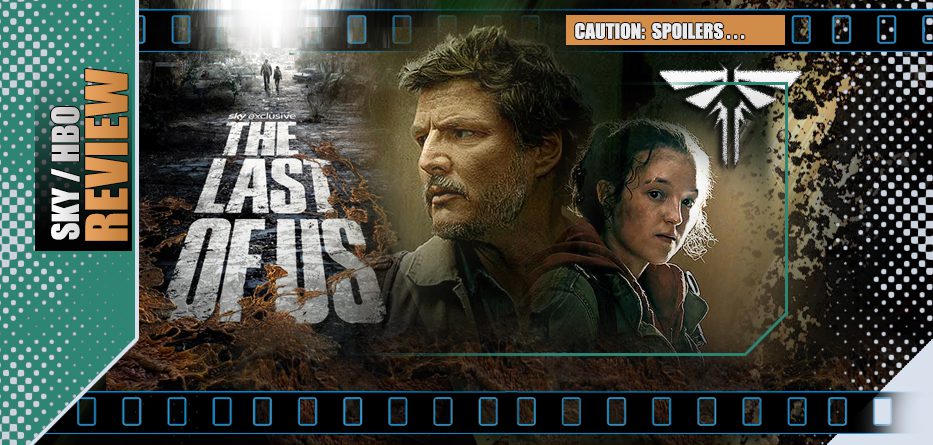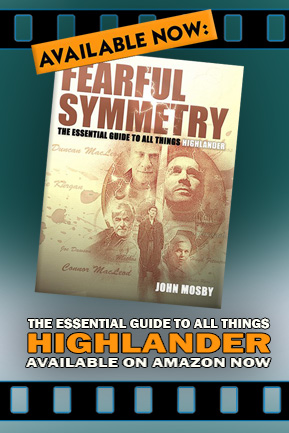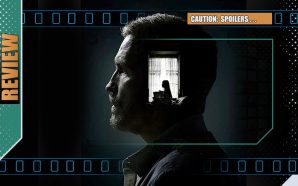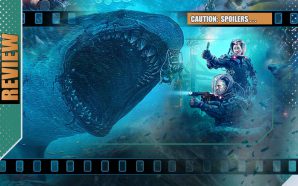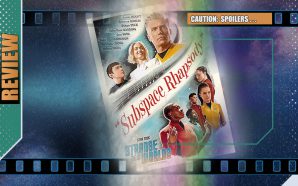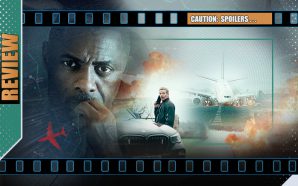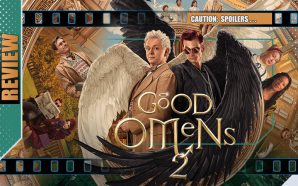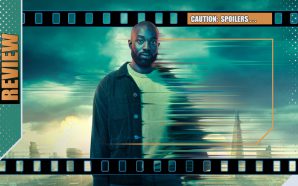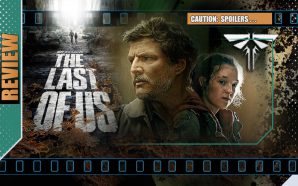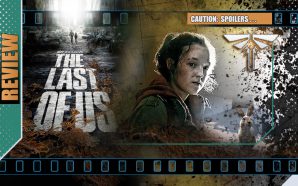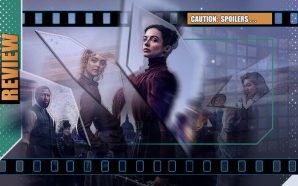Single-father and ex-military man Joel Miller does everything he can to make sure he and his daughter Sarah have everything they need, even if he has to miss the occasional birthday meal and rush out to keep his brother Tommy out of yet another skirmish. But something is happening – distant reports of global disturbances suddenly strike close to home and, inexplicably, there’s outbreaks of violence and berserker like bloodshed. From what little Joel can gether, it’s a kind of virus and the only thing he can think to do is to make sure he and Tommy get back to Annie to keep her safe.
Twenty years later, the virus has overtaken the Earth, leaving only small pockets of humanity ruled over by oppressive military forces, where people work for ration cards and the punishment for disobeying the rules can mean death. Even the underground ‘Fireflies’ movement seems to have been getting steadily weaker, but they’ve still managed to interfere with Joel’s plans to get out and find out what’s happened to Frank on his latest mission. Joel is offered a chance to flee the city, but only if he helps the Fireflies with one last smuggling job.
But this time, the ‘cargo’ isn’t drugs, black-market tools or ammunition. It’s a girl called Ellie. And Ellie has a secret that may change everything… but only if Joel can keep her alive long enough to get her where she needs to go…
*some spoilers*
Back in the ‘Before Times’, saying that a film was an adaptation of a video game meant – at best – something like the Resident Evil franchise or an easily-marketable summer tentpole and – at worst – something wholly disposable and soulless such as Super Mario Bros. and Pac-Man. It was not a particularly high benchmark in terms of creativity, the very idea suggesting a series of formulaic kinetic set-pieces surrounded by some minor dialogue and even less real characterisation.
Times have changed. In the same way that cable and streaming platforms have risen to the challenge of a multimedia world and taken on Hollywood at its own game in terms of quality and budget, the gaming industry has also flexed its muscles and created some memorable titles that are every inch the equal of their big-screen counterparts. With strong design, weighty narratives and complex strategies that defy their pixelated-origins, not to mention the rise in actual performance capture technology, the PlayStation experience has become more and more alluring for those demanding more. Pick up the right title and you could be entering the kind of world-building sagas that are as immersive as a good book or film, where the situations might have their action-quotient, but the characters and their backstories get you just as quickly invested in their fate.
One of the key releases in this (literal) game-changing era was 2013’s The Last of Us (and later, its 2020 sequel) from developer Naughty Dog and writer Neil Druckmann… giving us a landscape in which society had shifted in the wake of a fungal/viral outbreak that had ravaged humanity, leaving the cities crowded, forlorn areas of poverty and oppression and the land in between populated by desperate radicals and the primal creatures the virus had created from its victims. Joel, a weathered smuggler with a string of crippling personal losses behind him, is given the job of transporting a very different kind of ‘cargo’ across the country – a girl named Ellie. It turns out this is not just a mission of mercy but literally a turning-point in survival because Ellie isn’t quite the diminutive if angry girl she seems and a lot of people would want her for themselves if she can’t be protected. The concept melded together the emotional core of an extended ‘family’ unit with the post-apocalyptic architecture (that has become the toy-box of many modern dramas) and the strategy and the hi-def aspects of a game in which you sometimes have to fight, sometimes have to hide and the ‘player’ will always find help and hindrance as they explore the detailed land around them.
In many ways The Last of Us game was – from its very first frame – begging to be adapted as a seriously intense screen drama. With the quality of its imagery and its engaging story, it was easy to envision a full-on live-action version of the saga and though it’s taken a while and some unexpected twists and turns, the result has arrived this week on SKY and HBO and is well worth the wait. Once envisaged as a feature film, it’s now a nine-part series with every chance of continuing beyond this initial run and expanding out the story.
In later years The Walking Dead became less urgent and more bloated, still okay as a tv staple but nowhere near as essential and vital, doomed perhaps by repetition and catering for a massive cast. From the outset The Last of Us doesn’t dispense with the idea of an ensemble of actors bringing their A-game, but it never lets you forget its more precise focus of Joel and Ellie and that makes everything sharper and more desperate. The original game was ahead of its time and though the casual viewer may think they’ve seen this story and scenario play out before – and they possibly have – it’s still a deep seam to mine and The Last of Us offers riches that take a little time to excavate… simply by never treating it as a game at all.
The first episode – running to nearly ninety minutes – is something of a steady scene-setter, introducing us to the world we’re going to lose and what’s left of it to traverse two decades later. After a brief info-dump involving ‘archive’ footage from an old television debate regarding the dangers of viruses in general (specifically to the real-life Cordyceps fungal virus and the way it takes over insects’ motor functions to spread) and with a nice cameo by John Hannah, we’re into the lives of Joel (Pedro Pascal) brother Tommy (Gabriel Luna) and daughter Sarah (Nico Parker – who, in real life, is the daughter of actor Thandiwe Newton) and their back-story. Like the original game it’s initially warm and optimistic and gets us invested in the personal cost from the outset (and even more so as it gives us more time to get to know the characters and their routines in the hours before it’s all mercilessly up-ended). It’s something of a slow-burn, giving us the familiar and mundane normality we know before scratching it away like a festering scab. At first it’s just whispers of something a few miles away and off-camera, then it’s noticeable half-glimpsed twitches in the background as something starts to literally flex and sets off your viewer radar. When it does emerge and we realise the massive implications, things spiral quickly and within minutes suburbia has gone from white-picket fence neighbourly interaction to blood-stains on the unforgiving tarmac. Joel, his daughter Sarah and his brother Frank try to flee as the world crumbles around them, racing through the urban chaos in the same manner and choreography as the game propelled us forward. As a viewer, you’re quickly part of it all.
Then we pick up the story… twenty years later and they are not in a good place…
Dealing any ‘End Times’ scenario, there are inevitable touchstones here, impossible to ignore. Modern audiences have been brought up with apocalypses the same way previous generations were brought up on detective/lawyer/medical shows and the likes of the recently ended The Walking Dead (and its upcoming spin-offs) cast a long shadow leading to obvious comparisons. Other shows such as Y: The Last Man and Sweet Tooth, despite intriguing variations on a theme, have had very differing success rates (the former gone in less than a season and the latter, more subversive, heading for a second run next year).
Does this adaptation live up to expectations? The answer is definitely yes, but to varying degrees… The audience for SKY/HBO‘s The Last of Us will likely split neatly into two: those who have played the game and have been impatiently waiting for the adaptation’s arrival and then those with little knowledge of the story except the basic premise… Though that’s a difficult needle to thread and elements to juggle and pace – and opening salvos are notorious for being slower as they need to set the lay of the land – there’s enough here from the outset, slow though it might be, to please both camps. It’s remarkable (and perhaps as much a tribute to the source material) that the show can faithfully recreate key sequences from the game but never make them feel less than organic in real-time, alternatively chaotic and claustrophobic as the moments demand. For those who do know the game, the series won’t entirely surpass it but recognises its strengths and plays to them. Like any second telling of an epic story, there’s something both gained and lost along the way and if you already know the fates of characters or the evolution of the premise, you’ll likely be comparing and contrasting those tellings throughout, especially in the reverential first chapter. There’s much to be explored, even in parallel and the only quibble is that for all the mentions of the Cordyceps-origins, the pilot doesn’t really explain the nature of how the virus is being spread other than the zombie-esque biting (It’s also air-driven like pollen in enclosed spaces in the game). Ironically, the game and its side-missions and connective tissue gave more moments for side-missions and to ‘breathe’ away from the intense violence and combat, but the show pivots ever so slightly and delves deeper into other territories. It’s a trade-off without much of a downside. If you’re completely new to it all, there’s enough quality material to latch on to, to keep you watching even if it may initially seem to be on familiar ground. If you’re already a fan, you know the already high standards it emulates and where it succeeds.
But the key thing is that there’s quality in all departments here – from casting and direction through to design and post-production. Pedro Pascal gets to shed the action-figure elements of his popular but somewhat thankless and generic The Mandalorian role and immediately gives Joel a world-weary gravitas with a face that’s earned every line and which makes his character less of a hero (at least at the outset) and simply more of a pragmatist trying to hang on to what little he has left as the world devolves around him. Bella Ramsey (also a Game of Thrones veteran) might not have been the obvious choice for Ellie (the original game made the character look more like the Ellen Page of the day), but she too immediately understands the broken heart of the character and grasps it will two dirty hands and a string of casual profanity that makes her character understandably petulant beyond her years. There’s able support from the likes of familiar faces such as Anna Torv, Gabriel Luna and Merle Dandridge, all getting their hands and faces dirty in the process and with several more proven names and faces to appear later in the run. (The original game’s voice talent Ashley Johnson and Troy Baker will cameo in other parts). The opener sets out their world and lets them meet up and begin their journey, but with these decent foundational pillars, it will be subsequent episodes that build on that tenuous bond and that’s what’s worth sticking around to witness.
The production design has done a deep-dive into the beauty of the game and replicated important elements of its world that will be immediately recognisable to die-hard fans. Sometimes these are just added bonuses, background easter-eggs and nods sometimes more important, but it’s clear that there was an intent to be a love-letter to the multi-layered source-material. The world, however twisted, is believable and cohesive. There’s the clothing, the streets, the architecture – be it wire-fences lit up by oppressive thunder-storms, the ramshackle tenement buildings where outliers make their living or the creaking, toppled skyscrapers that all feel part of one devastated world and you never feel that the human element and the post-production pixels are fighting for supremacy. Craig Mazin’s writing and direction go hand-in hand, giving us wide, expansive shots when needed and close-ups as Ramsey, Pascal and their quality supporting cast channel every facial flicker caught by the dust-dancing lighting. It’s terrible, beautiful result should be no surprise, coming from the man who steered the acclaimed Chernobyl to success.
In later years The Walking Dead became less urgent and more bloated, still okay as a tv staple but nowhere near as essential and vital, doomed perhaps by repetition and catering for a massive cast. From the outset The Last of Us doesn’t dispense with the idea of an ensemble of actors bringing their A-game, but it never lets you forget its more precise focus of Joel and Ellie and that makes everything sharper and more desperate. The original game was ahead of its time and though the casual viewer may think they’ve seen this story and scenario play out before – and they possibly have – it’s still a deep seam to mine and The Last of Us offers riches that take a little time to excavate simply by never treating it as a game at all. Again, the opener is just a scene-setter, laying the foundational work needed but it does most things required and despite the ‘dystopian thinning of the population genre’ itself ironically running the risk of repetitive over-crowding, this is an exciting, bittersweet, desolate and poignant entry that stands tall in its own right and feels every inch a worthy addition to your must-see schedule…
In the UK The Last of Us runs every Monday on SKY from 16th January (within twenty-four hours of HBO‘s Sunday broadcast in the US).
To enable more fans of ‘The Last of Us‘ to catch up on what the fuss is all about, the series premiere will be officially available FREE on YouTube today. (Both in the UK and US).
The UK link, viable from now, is: https://youtu.be/kzGMFpLIcyE

- Story9
- Acting10
- Direction10
- Production Design / VFX10

